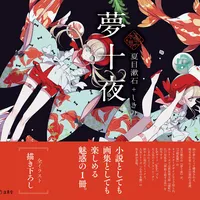1. 第 一夜 (3)
だい|いちや
1. erste Nacht (3)
1. first night (3)
1. primera noche (3)
1. primeira noite (3)
自分 は 苔 の 上 に 坐った 。
じぶん||こけ||うえ||すわった
Ich saß auf dem Moos.
I sat on the moss.
Sentei-me no musgo.
これ から 百 年 の 間 こうして 待って いる んだ な と 考え ながら 、 腕組 を して 、 丸い 墓石 を 眺めて いた 。
||ひゃく|とし||あいだ||まって|||||かんがえ||うでぐみ|||まるい|はかいし||ながめて|
Ich verschränkte die Arme und schaute auf den runden Grabstein und dachte, darauf würde ich die nächsten hundert Jahre warten.
Thinking that I was waiting for the next 100 years, I was looking at the round tombstone with my arms folded.
その うち に 、 女 の 云った 通り 日 が 東 から 出た 。
|||おんな||うん った|とおり|ひ||ひがし||でた
Irgendwann kam die Sonne aus dem Osten, genau wie die Frau gesagt hatte.
The sun came out of the east, just as the woman had said.
Em pouco tempo, o sol nasceu no leste, exatamente como a mulher havia dito.
大きな 赤い 日 であった 。
おおきな|あかい|ひ|
Era um grande dia vermelho.
それ が また 女 の 云った 通り 、 やがて 西 へ 落ちた 。
|||おんな||うん った|とおり||にし||おちた
It fell again to the west, just as the woman had said.
Assim como a mulher havia dito, acabou caindo para o oeste.
赤い まん まで のっと 落ちて 行った 。
あかい||||おちて|おこなった
It fell down to the red bun.
Caiu direto no coque vermelho.
一 つ と 自分 は 勘定 した 。
ひと|||じぶん||かんじょう|
One and I took a count.
Eu contei um.
・・
...
しばらく する と また 唐 紅 の 天道 が の そり と 上って 来た 。
||||とう|くれない||てんどう|||||のぼって|きた
After a while, a reddish-white sleigh came up again.
Depois de um tempo, outro tentáculo de cor vermelha surgiu com um trenó.
そうして 黙って 沈んで しまった 。
|だまって|しずんで|
And then, without saying a word, he sank.
Então eu afundei silenciosamente.
二 つ と また 勘定 した 。
ふた||||かんじょう|
Aceitei mais duas contas.
・・
自分 は こう 云 う 風 に 一 つ 二 つ と 勘定 して 行く うち に 、 赤い 日 を いく つ 見た か 分 ら ない 。
じぶん|||うん||かぜ||ひと||ふた|||かんじょう||いく|||あかい|ひ||||みた||ぶん||
I don't know how many red days I have seen as I count them one by one.
Eu não sei quantos sóis vermelhos eu vi enquanto contava um por um assim.
勘定 して も 、 勘定 して も 、 し つくせ ない ほど 赤い 日 が 頭 の 上 を 通り越して 行った 。
かんじょう|||かんじょう|||||||あかい|ひ||あたま||うえ||とおりこして|おこなった
The red sun was so red that I couldn't keep count of it.
Depois de contar, contar, o sol vermelho passou sobre minha cabeça.
それ でも 百 年 が まだ 来 ない 。
||ひゃく|とし|||らい|
But the century has not yet come.
Ainda assim, 100 anos ainda não chegaram.
しまい に は 、 苔 の 生えた 丸い 石 を 眺めて 、 自分 は 女 に 欺 さ れた ので は なかろう か と 思い出した 。
|||こけ||はえた|まるい|いし||ながめて|じぶん||おんな||あざむ||||||||おもいだした
Finally, looking at the round stone with moss growing on it, he wondered if he had been deceived by a woman.
Finalmente, olhando para a pedra redonda coberta de musgo, lembrou-se de que havia sido enganado por uma mulher.
・・
すると 石 の 下 から 斜 に 自分 の 方 へ 向いて 青い 茎 が 伸びて 来た 。
|いし||した||しゃ||じぶん||かた||むいて|あおい|くき||のびて|きた
Then a blue stem grew out from under the stone, facing diagonally toward me.
Então, debaixo da pedra, um caule azul cresceu diagonalmente em minha direção.
見る 間 に 長く なって ちょうど 自分 の 胸 の あたり まで 来て 留まった 。
みる|あいだ||ながく|||じぶん||むね||||きて|とどまった
As I watched, it lengthened and came to just below my chest and stayed there.
Enquanto eu observava, crescia cada vez mais até chegar ao meu peito e ficar lá.
と 思う と 、 すらりと 揺 ぐ 茎 の 頂 に 、 心 持 首 を 傾けて いた 細長い 一 輪 の 蕾 が 、 ふっくら と 弁 を 開いた 。
|おもう|||よう||くき||いただ||こころ|じ|くび||かたむけて||ほそながい|ひと|りん||つぼみ||||べん||あいた
At the top of the stem, a long, slender bud, which had been tilting its head slightly, plumped up and opened its petals.
真 白 な 百合 が 鼻 の 先 で 骨 に 徹 える ほど 匂った 。
まこと|しろ||ゆり||はな||さき||こつ||てつ|||におった
The white lilies smelled so bad that it was bone-chilling to the tip of my nose.
そこ へ 遥 の 上 から 、 ぽたり と 露 が 落ちた ので 、 花 は 自分 の 重み で ふらふら と 動いた 。
||はるか||うえ||||ろ||おちた||か||じぶん||おもみ||||うごいた
自分 は 首 を 前 へ 出して 冷たい 露 の 滴る 、 白い 花弁 に 接吻 した 。
じぶん||くび||ぜん||だして|つめたい|ろ||したたる|しろい|かべん||せっぷん|
I leaned forward and kissed the white petals, which were dripping with cold dew.
自分 が 百合 から 顔 を 離す 拍子 に 思わず 、 遠い 空 を 見たら 、 暁 の 星 が たった 一 つ 瞬いて いた 。
じぶん||ゆり||かお||はなす|ひょうし||おもわず|とおい|から||みたら|あかつき||ほし|||ひと||またたいて|
・・
「 百 年 は もう 来て いた んだ な 」 と この 時 始めて 気 が ついた 。
ひゃく|とし|||きて||||||じ|はじめて|き||
I realized for the first time that a hundred years had already passed. I realized for the first time that the century had already come.

